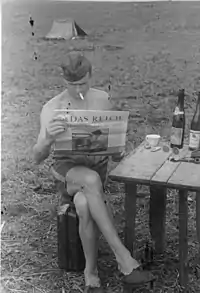Das Reich (newspaper)
Das Reich (German: The Reich[1]) was a weekly newspaper founded by Joseph Goebbels, the propaganda minister of Nazi Germany, in May 1940.[2] It was published by Deutscher Verlag.

History
Das Reich was mainly the creation of Rudolf Sparing, Rolf Rienhardt and Max Amann.[3]
Its circulation grew from 500,000 in October 1940 to over 1,400,000 by 1944.[4]
Aside from a weekly editorial, Goebbels was not involved in the publication.[5] Most, but not all, of his articles after 1940 appeared in it.[6] In the 1930s his articles had appeared in Der Völkische Beobachter but then he wished to target a more sophisticated and intellectual readership. From May 1940 he wrote 218 editorials.[7]
When Allied forces landed in Italy, and Mussolini was briefly deposed, Goebbels decided not to write an editorial.[8]
Contents
The paper contained news reports, essays on various subjects, book reviews, and an editorial written by Goebbels.[9] Some of the content was written by foreign authors.[10] With the exception of Goebbels’ editorial, Das Reich did not share the tone of other Nazi publications.[11]
Among other topics, it covered the uncertain casualty lists from Stalingrad,[12] distinguished between German and Allied invasions to suggest the latter would be unsuccessful,[13] discussed the bombing raids[14] and the V-1,[15] deplored American culture,[16] portrays American morale as poor (though not suggesting they would give up because of it),[17] and finally declared that Berlin would fight to the end.[18]
Goebbels's editorials covered a wide range of topics. His first bragged of the accomplishments of Nazi Germany, which was then conquering France.[19] He spoke with continuing confidence as France fell, of the opportunities the "plutocracies" had missed for peace.[20] Later he issued vitriolic anti-Semitic articles,[21][22][23][24] argued against listening to enemy propaganda.[25] encouraged them for total war[26] declared England bound to lose the war,[27] attacked the still neutral United States,[28] discussed the significance of its entry into the war,[29] talked about prospects for a new year,[30] presented German radio as a good companion (when, in fact, he hoped to lure them from enemy propaganda broadcasts),[31] professed to be delighted that Churchill was in command in Britain,[32] discussed cuts in food rations and severe treatment for black market dealings,[33] urged that complaints not get in the way of the war effort,[34] accused Douglas MacArthur of cowardice (ineffectually, as the Germans knew he had been ordered to leave),[35] talked of the Allied bombing,[36] describes the sinking of Allied ships by German U-boats,[37] explained Soviet resistance in Sevastopol as product of a stubborn but bestial Russian soul,[38] decried the United States as having no culture,[39] urged that Germans not allow their sense of justice be exploited by their enemies,[40][41] and claimed that the Allies were as weary as the Axis.[42]
His final article in April 1945 called for last-ditch resistance.[43]
See also
- Other newspapers of Nazi Germany:
- Der Angriff ("The Attack"), Josef Goebbels' Berlin-based newspaper
- Berliner Arbeiterzeitung ("Berlin Workers Newspaper"), Gregor and Otto Strasser's newspaper, representing the Strasserite wing of the Nazi Party
- Illustrierter Beobachter ("Illustrated Observer"), illustrated companion to the Völkischer Beobachter
- Panzerbär ("The Panzer Bear"), a tabloid Nazi newspaper intended for the troops defending Berlin from the Red Army
- Das Schwarze Korps ("The Black Corps"), the official newspaper of Heinrich Himmler's Schutzstaffel (SS)
- Volkischer Beobachter, the official Nazi newspaper
- Der Stürmer ("The Stormer"), Julius Streicher's Nuremberg-based virulently antisemitic and frequently semi-pornographic newspaper
References
Notes
- Michael & Doerr, (2002) Nazi-Deutsch / Nazi-German: An English Lexicon of the Language of the Third Reich.
- Welch, The Third Reich, p. 126.
- Hale, The Captive Press, p. 278.
- Herf, Jeffrey, The Jewish Enemy: Nazi Propaganda During World War II and the Holocaust, Harvard University Press, 2009, ISBN 9780674038592, p.21
- Hale, The Captive Press, p. 278.
- "The Veil Falls"
- Herf, Jeffrey, The Jewish Enemy: Nazi Propaganda During World War II and the Holocaust, Harvard University Press, 2009, ISBN 9780674038592, p.21
- "A Classic Example"
- Shapiro, Why Didn't the Press Shout?, p. 312.
- Shapiro, Why Didn't the Press Shout?, p. 313.
- Hale, The Captive Press, p. 278.
- "On the Missing at Stalingrad"
- "The Invasion"
- "Unexpected Consequences"
- "First Results of the V-1"
- "The Kitschified Mass Soul"
- "Reality is Different:Disillusioned USA Soldiers"
- "Berlin: A Huge Hedgehog"
- "A Unique Age"
- "Missed Opportunities"
- "Mimicry"
- "The Jews are Guilty!"
- "The War and the Jews"
- "The Creators of the World's Misfortunes"
- "The Matter of the Plague"
- "When or How?"
- "The Clay Giant"
- "Mr. Roosevelt Cross-Examined"
- "A Different World"
- "The New Year"
- "The Good Companion"
- "Churchill's Trick"
- "An Open Discussion"
- "The Paper War"
- "Heroes and Film Heroes"
- "The Air War and the War of Nerves"
- "The Tonnage War"
- "The So-Called Russian Soul"
- "God's Country"
- "commitment to war
- "30 Articles of War for the German People"
- "The World Crisis"
- "Resistance at Any Price"
Bibliography
- Randall Bytwerk. "Cartoons from Das Reich: 1944-1945". Das Reich 1940–1945. Retrieved August 16, 2006.
- Hale, Oron J., The Captive Press in the Third Reich (Princeton, 1964)
- Robert Michael and Karin Doerr. Nazi-Deutsch / Nazi-German: An English Lexicon of the Language of the Third Reich. Greenwood. 2002.
- Welch, David, The Third Reich: Politics and Propaganda (London, 1993)